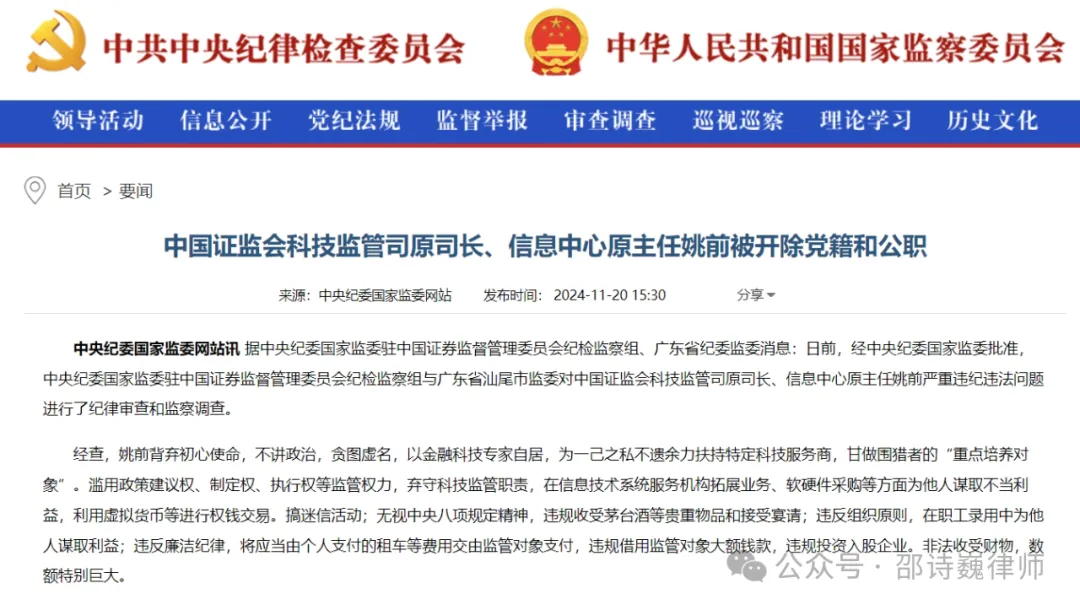引言:
2024年11月20日,官方通报了一则消息。中国证监会科技监管司原司长、信息中心原主任姚前被开除党籍和公职。通报指出,姚前为一己之私不遗余力扶持特定科技服务商、,甘做围猎者的「重点培养对象」,利用虚拟货币等进行权钱交易。

近年来,虚拟货币因其匿名性和去中心化的特点备受关注,但同时也成为某些违法犯罪行为的新工具,其中就包括行贿受贿。
今天就来聊聊关于利用虚拟货币行贿受贿的相关法律问题。
作者 |邵诗巍律师
01
利用虚拟货币行贿受贿的相关案例
虽说根据国内政策规定,虚拟货币仅视为一种“虚拟商品”,不具有与法币同等地位,但虚拟货币所具有的价值不可否认,在很多人看来,例如主流的比特币、以太坊、泰达币等所具有的经济价值,是可以像“钱”一样用来支付或兑换的。所以,往后可能利用虚拟货币行贿受贿的案件会更多的披露出来。
1、 姚前——中国人民银行数字货币研究所首任所长
2016年,央行首次提出对外公开发行数字货币的目标,并启动了基于区块链和数字化币的数字票据交易平台原型研发工作,并完成了法定数字货币第一代原型系统搭建。2017年,姚前被任命为中国人民银行数字货币研究所首任所长,在中国开发央行数字货币的早期努力中发挥了重要作用。2018年,姚坚转任中国证券监督管理委员会,继续制定与区块链技术和数字资产相关的政策。此外,姚前还发表了多篇关于数字货币和区块链技术的论文,为中国数字货币的发展奠定了理论基础。
2024年11月,姚前因严重违纪违法问题被开除党籍和公职。作为数字货币领域的权威人士,姚前的违纪行为可能削弱公众对数字货币的信任,影响其接受度和推广速度。该案也可能会进一步降低我国重新考虑对加密货币市场强硬立场的可能性。
2、 肖毅——前江西省政协副主席、抚州市委书记
2023年8月22日,浙江省杭州市中级人民法院公开宣判江西省政协原党组成员、副主席肖毅受贿、滥用职权一案,对被告人肖毅以受贿罪、滥用职权罪被判处无期徒刑。
肖毅在任抚州市委书记期间,明知九木集团创世纪科技有限公司从事虚拟货币“挖矿”活动,仍违规提供财政补贴、资金支持、电力保障等,致使公共财产遭受重大损失,造成恶劣社会影响。据知情人透露,肖毅在任期间,疑似收受贿赂超过8000枚比特币。
3、 海某——某公安机关办案人员
南京市人民检察院在2024年5月份发布了一个案例,海某担任某公安局人员,主要职责为掌握计算机信息网络违法犯罪动态,侦查网络违法犯罪案件等。被告人海某利用上述职务上的便利,通过下属吴某,获取到该案中含有比特币信息的涉案电子数据,并将数据发送给了其朋友季某某(某网络科技有限公司负责人、技术人员),后季某某破解上述比特币密钥并盗窃部分比特币,海某默认了该行为。后被告人海某也未及时报告查处,而是多次向季某某索要现金及比特币。案发后办案单位将比特币进行变现,得款人民币4822.72万余元。
02
用虚拟货币行贿受贿,为什么会被查到?
虚拟货币因其去中心化和隐秘性,通常被认为难以追踪,因而被有心人士作为不法交易的隐秘手段。但以下原因可能导致虚拟货币相关行为被发现和查处:
1. 区块链技术的公开性
尽管虚拟货币交易具有一定的匿名性,但大多数加密货币(如比特币)基于区块链技术,所有交易都会被记录在区块链上。监管部门可以通过分析公开的区块链数据,追踪虚拟货币交易的流向。
并且,通过区块链分析工具(如Chainalysis),监管机构可以发现可疑的大额转账、频繁交易地址等线索,从而锁定相关账户。
2. 线下证据暴露
与行贿受贿的相关的,必然会伴随着其他权钱交易行为。一旦关联的涉案人员被调查,那么通过虚拟货币收受财物的行为就可能被揭发。
若收受虚拟货币的人员通过OTC交易的方式变现,那么相关的资金流动可能通过银行转账、第三方支付平台等显现异常,引起银行风控及反洗钱系统的警觉。涉案人员也可能因为频繁交易或大额转账,引起交易所或平台的注意。
3. 企业或项目的违规行为
虚拟货币产业项目涉及的合同、资金拨付记录和政府支持文件,都可能成为调查的切入点。如肖毅案中,地方政府对虚拟货币“挖矿”活动提供了资金、电力等支持,这类违规行为在企业或行政审计中容易被发现。
4.技术进步与监管合作
随着监管技术的发展,虚拟货币交易的匿名性正逐渐被弱化。执法机关利用技术手段,可以通过网络流量监控、交易所数据等途径获得关键信息。全球各国加强对虚拟货币的监管合作,相关线索可能通过国际执法机构(如国际刑警)提供。
03
查出一个受贿案,就结束了吗?
受贿案件通常涉及行贿方。调查受贿人时,可以顺藤摸瓜查出行贿方的具体行为、次数和范围。如企业或个人为了获得不正当利益,向官员或其他相关人员行贿。因此,相关的行贿人员也会被牵连查出。
2021年9月,中央纪委国家监委会同中央组织部、中央统战部、中央政法委、最高人民法院、最高人民检察院联合印发了《关于进一步推进受贿行贿一起查的意见》,明确要求坚持受贿行贿一起查,重点查处多次行贿、巨额行贿以及向多人行贿等行为。《中华人民共和国刑法修正案(十二)》对行贿罪和受贿罪的规定进行了重要修改,增加了七种行贿从重处罚的情节,进一步加大了对于贿赂犯罪的惩治力度。
除了行贿方之外,还会牵连虚拟货币承兑商(U商)、地下钱庄等一大波群体。
2024年8月20日起施行的《关于办理洗钱刑事案件适用法律若干问题的解释》明确,将通过“虚拟资产”交易列为洗钱方式之一。且规定了若同时构成洗钱罪和掩隐罪,以较重的洗钱罪定罪处罚。
邵律师此前办理过一起U商涉嫌非法经营罪的案件,就是因为某地办案单位在办理一起职务犯罪案件时,查到该U商的上家帮助职务犯罪的被告人进行虚拟货币的法币变现,导致其也被牵连其中。
04
写在最后
虽然虚拟货币交易具有隐秘性,但作为普通人,我们应认识到,不要抱着侥幸心理以为利用虚拟货币支付手段就能躲过法律的追查。行贿受贿,不管是给现金还是用虚拟货币,只要涉及不法利益输送,就可能触犯刑法,涉嫌犯罪。






